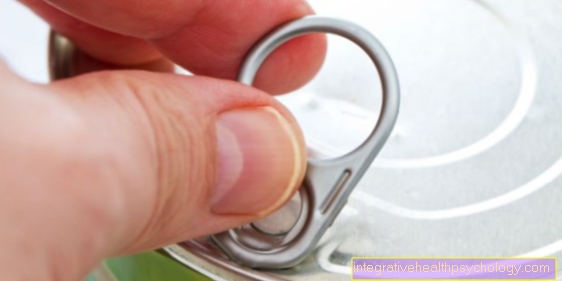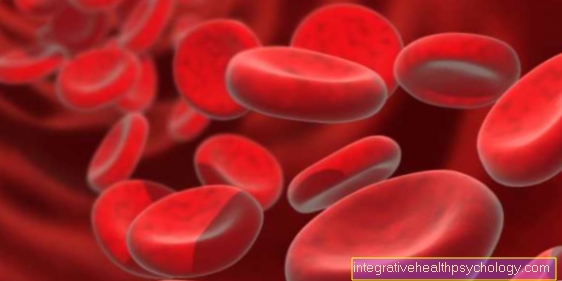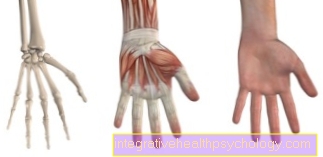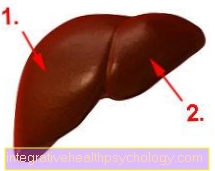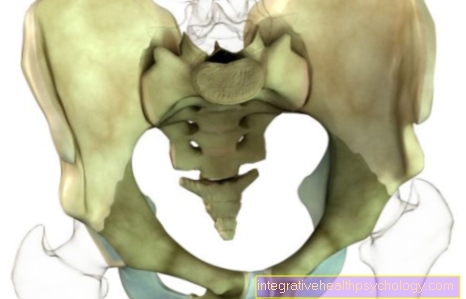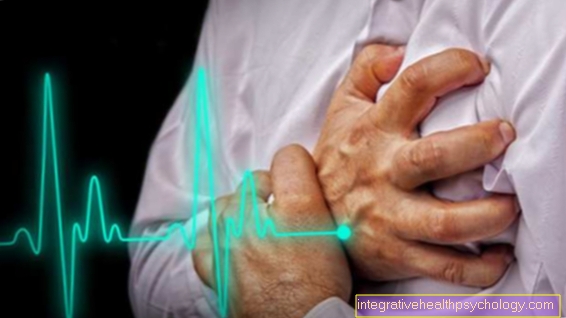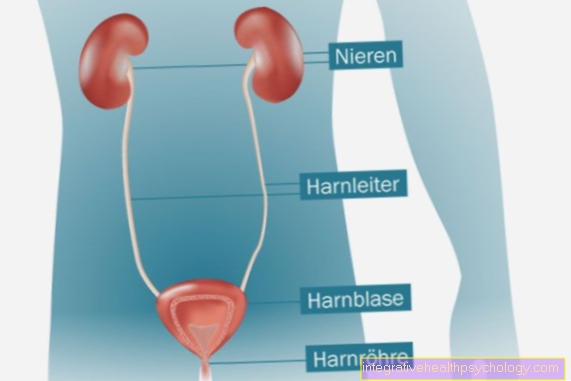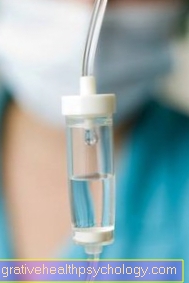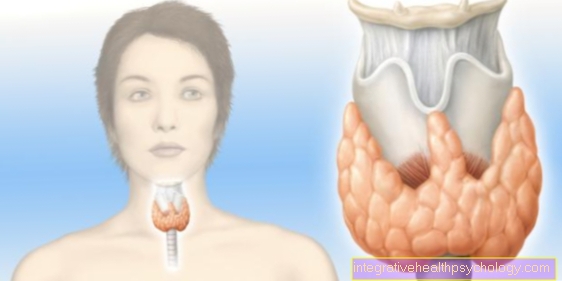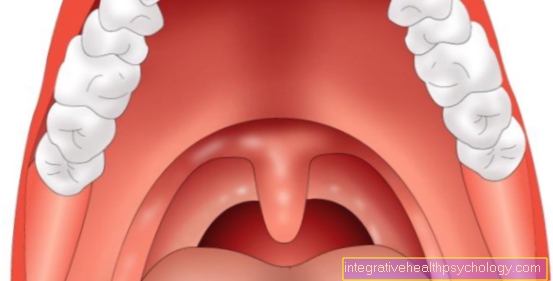Beta blockers
Synonyms in a broader sense
- Beta-blockers
- Beta adrenergic blockers
- β-blockers
definition
Beta blockers are mainly Used in the therapy of cardiovascular diseases, but there are also other areas of application.
This group of drugs blocks the docking of messenger substances with the so-called beta receptors, which are found in the heart, lungs, muscles, pancreas, kidneys, blood vessel walls and adipose tissue. They thus prevent the messenger substances from developing their effect. Messenger substances that attack the beta receptors and cause an effect are the hormones adrenaline and noradrenaline, which are known as catecholamnia and originate from the stress-mediating (sympathetic) nervous system.
The processes that occur through activation of the beta receptors are e.g. an increase in the heartbeat, a faster pulse, a narrowing of the vessels, the widening of the lungs when inhaling or the provision of sugar from the energy stores of the muscles. With the help of beta blockers, these processes can be influenced, which is used for therapeutic purposes.
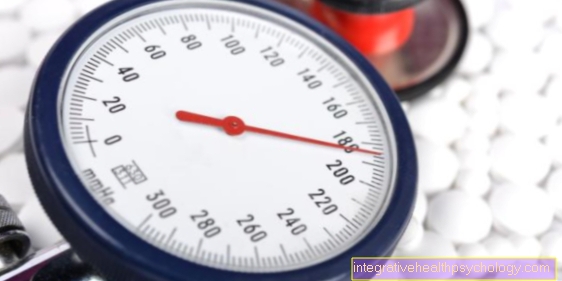
General effect
Beta blockers block special receptors that are found on a variety of different cells and organs throughout the body. They are usually taken in tablet form and enter the bloodstream through the gastrointestinal tract. They are distributed throughout the body via the blood and have no effect on the so-called beta receptors. Receptors are docking points on the cells for messenger substances. According to the lock and key principle, only certain substances can bind to the special receptors.
By blocking the beta receptors, the beta blockers generally inhibit the effects of the stress hormones adrenaline and noradrenaline, which normally mediate their effect via these receptors. As a result, heart rate and blood pressure, for example, drop. In the lungs, the drugs narrow the bronchi. Since there are different types of beta receptors in the body (especially beta-1 and beta-2), a distinction is made between the selective beta blockers, which only work on one of the subtypes, from the unselective ones, which can bind to beta-1 and beta-2.
Effect on the heart
Beta blockers act on the heart in different places. First of all, the heart rate and thus the pulse is lowered, which is particularly useful for cardiac arrhythmias with a heartbeat that is too fast.
Read more on the topic: Drugs for cardiac arrhythmias
The beta blockers also reduce the force with which the heart beats. This also reduces the energy and oxygen consumption of the heart muscle. This is especially important with coronary artery disease and a heart attack. These effects on the heart also lower blood pressure, so beta blockers can be used to treat high blood pressure. But also with heart pumping weakness (Heart failure) beta blockers can have a positive effect, as they economize the work of the heart.
Read more on the topic: Effect of beta blockers
The use of beta blockers is diverse!
Recommendations for the use of therapy with beta blockers can be made for several diseases.
Patient with
- high blood pressure (hypertension)
- coronary artery disease (CHD)
- who have a heart attack (myocardial infarction)
- a restriction in the pumping ability of the heart in the sense of cardiac insufficiency (heart failure)
and - Cardiac arrhythmia
benefit from therapy with beta blockers.
In addition to these areas of application, beta blockers are effective drugs in the treatment of the following diseases.
Beta blockers come with patients
- an overactive thyroid gland (hyperthyroidism)
- a pheochromocytoma
- increased pressure in the eye (glaucoma, also called glaucoma)
and - Migraines for preventive therapy
for use.
Which drugs are beta blockers?
The following overview shows the beta blockers most commonly used for therapy:
Active ingredient name: (name of the preparation)
- Propanolol: e.g. Dociton®, Inderal®, Elbrol®
- Atenolol: e.g. Atebeta®, Cuxanorm®, Tenormin®
- Sotalol: e.g. Darob®, Favorex®, Gilucor®
- Metoprolol: e.g. Belok®, Prelis®
- Acebutolol: e.g. Prent®
- Bisoprolol: e.g. Concor®, Biso Beta®
- Nebivolol: e.g. Nebilet®, Lovibon®
- Carvedilol: e.g. Dilatrend®, Dimetil®
The column "Name of the preparation" contains the names of the pharmaceutical companies for their drugs with a special active ingredient from the group of beta blockers.
Alternatives to beta blockers
Beta blockers are a possible therapy option for a large number of diseases. In most cases, however, there are also alternatives in the form of other drugs or non-drug measures. Which alternatives to beta blockers are available depends on the disease or indication the patient has. If, for example, too high blood pressure is to be reduced, there are various other drug groups in addition to beta blockers, such as the so-called ACE inhibitors or the sartans.
When treating a glaucoma (Glaucoma) In addition to eye drops with beta blockers as an active ingredient, there are also a number of possible alternatives.
Beta blockers are also sometimes used for migraines to prevent seizures. There are also various alternatives for this indication. Endurance sport is a good and effective non-drug alternative that does not have side effects.
Read more on the topic: Therapy for migraines
Treatment of high blood pressure
High blood pressure is, among other things, caused by the activity of the sympathetic nervous system, the stress-relieving nervous system. The sympathetic nervous system stimulates so-called beta receptors, which activates the heart and the circulatory system:
The heartbeat becomes faster and stronger, which means more work on the heart. It also increases blood pressure.The greater stress on the heart increases oxygen consumption and there is a risk of the heart muscle being insufficiently supplied with oxygen (ischemia).
The drug group of beta blockers inhibits the occurrence of the listed effects:
Beta blockers reduce the frequency (beats of the heart per minute) and the beating force of the heart, which leads to a relief of the organ. The oxygen consumption of the less stressed heart muscle thus falls, so that the risk of an insufficient supply of oxygen is reduced. These effects occur because the beta blockers reduce the effects of stress hormones on the heart. The higher the activity of the stress-mediating nervous system, the more pronounced the effect of lowering blood pressure under therapy with beta blockers.
Note: beta blockers
It should be noted that beta blockers must never be stopped suddenly, as this would lead to an excessive rise in blood pressure! It is also worth knowing that the full effect of beta blockers only sets in after a few days to weeks.
Treatment with beta-blockers leads to a lower risk of dying from cardiovascular diseases and therefore beta-blockers are prognostic drugs in patients with high blood pressure.
You can find more information on the subject at: high blood pressure
Coronary artery disease (CHD) treatment
Coronary artery disease is characterized by the fact that less blood, and therefore less nutrients and oxygen, reaches the heart due to the narrowed coronary vessels. There is a risk of a heart attack, in which the blood supply to the heart is interrupted and heart muscle tissue dies.
Mostly they are Coronary arteries narrowed as it went through arteriosclerosis have changed walls. Atherosclerosis is also called "Hardening of the arteries" and means that there are deposits on the vessel walls. In vessels with wall damage from arteriosclerosis it can easily become Blood clot formation come, which narrows the vessel even more or even closes it completely. In the case of the coronary arteries, a vascular blockage would lead to a heart attack.
To prevent a further decrease in blood flow and a heart attack, come Beta blockers for use:
The beta blockers reduce the volume of blood that the heart pumps into the circulation with each beat. In addition, the pulse decreases, i.e. the heartbeats per minute decrease and the heart has to perform less. With the help of beta blockers, it takes a calmer situation and uses less oxygen. In this way, the supply of oxygen to the heart is improved or consumption is reduced and an oxygen deficiency is prevented.
You can find more information on the subject at: Coronary heart disease
Treatment of a heart attack
Therapy with beta blockers reduces the patient's risk of illness and mortality in the follow-up phase after a heart attack.
The forecast of patients who have had a heart attack, improves by taking this group of drugs.
The administration of beta blockers after an acute heart attack event is called secondary prophylaxis. Secondary means “second in a sequence” and prophylaxis means preventive treatment so that disease does not occur.
Since you want to prevent another heart attack, beta blockers become Secondary prophylaxis given.
You can find more information on the subject at: Heart attack
Treatment of heart failure
The Heart failure (Heart failure) represents the inability of the heart to adequately oxygenate the organs of the body. In stable patients, beta blockers are given to improve cardiac output:
The drugs protect the heart from the effects of stress-relieving hormones by blocking the Heart rate and thus improve the oxygen supply to the heart.
The severity of heart failure is divided into four levels. Patients who also have high blood pressure or who have had a heart attack are always given a beta blocker. If the heart failure alone is present, beta blockers are only prescribed from the second severity level.
Treatment should be started with a low dose of beta-blockers, because heart failure, as the name suggests, makes the heart weak and the patient may be sensitive to a dose that is too high. If the patient tolerates the beta blocker well, the dose can be increased slowly.
You can find more information on the subject at: Heart failure
Treatment of irregular heartbeat
Cardiac arrhythmias are also called arrhythmia designated. It is understood to mean a disruption of the normal heartbeat sequence, caused by irregular processes in the development and conduction of excitation in the heart muscle. Patients' hearts do not beat regularly. Cardiac arrhythmias can be life-threatening and occur as a result of heart disease or other diseases. But they also occur in healthy people and have no disease value.
Many diseases are summarized under the generic term “cardiac arrhythmias”. The following arrhythmias are treated with the help of beta blockers:
The beating of the heart too fast is also called tachycardia. If the heart beats not only quickly but also not evenly, one speaks of a tachy-arrhythmia, i.e. a coupled disorder. Other forms in which beta-blocker therapy can be helpful are atrial fibrillation and additional heartbeats, the so-called Extrasystoles .
The effect of beta blockers is to reduce the excitability of the heart. The drugs cause the heart to beat too often. Thus the heart rate (heartbeats per minute) decreases.
The heart is relieved by the beta blockers, the heartbeat is slowed down and takes place in regular succession.
You can find more information on the topic at: Cardiac arrhythmia
Treatment of overactive thyroid gland (hyperthyroidism)
A Hyperthyroidism leads to various symptoms due to the excess of thyroid hormones in the body:
The patients are often nervous and restless. They notice their fingers trembling and report insomnia. The heartbeat (heart rate) is increased and patients experience strong palpitations. There may be extra beats of the heart (= extrasystoles) or cardiac arrhythmias, which the patients usually describe as "heart stumbling". The blood pressure is often increased in hyperthyroidism.
First and foremost is the treatment of the underlying disease, hyperthyroidism, with appropriate procedures. The beta blockers can be given as additional medication to lower the patient's heart rate and high blood pressure and reduce the uncomfortable feeling of the patient Palpitations and to alleviate severe palpitations.
You can find more information on the topic at: Hyperthyroidism
Therapy with beta blockers for pheochromocytoma
The Pheochromocytoma is a disease in which a tumor produces too much hormones. This hormone-producing tumor is made up of cells derived from the stress-inducing nervous system. The pheochromocytoma produces the stress-relieving hormones adrenaline and noradrenaline in large quantities and releases them into the bloodstream. Norepinephrine and adrenaline are so called Catecholamines. Adrenaline causes blood vessels to constrict, while noradrenaline has a vasodilating effect and causes the heart to increase the heart rate and make it more powerful. For the most part, the pheochromocytoma forms adrenaline, which is why vascular narrowing takes place and high blood pressure occurs very often in the affected patients.
The causal treatment of pheochromocytoma is surgery. However, it is important to administer medication to the patient before and after surgery to reduce the body's rapid heartbeat in response to the lowered blood pressure. However, beta blockers may only be used if treatment with alpha blockers has already been started. If surgery to remove the tumor cannot be performed, this form of drug-assisted treatment is used to lower the patient's blood pressure.
You can find more information on the topic at: Pheochromocytoma
Treatment of increased pressure in the eye
This eye disorder is also known as glaucoma. The optic nerve is damaged in this condition, which is called optic neuropathy. Not always, but very often, glaucoma is associated with increased intraocular pressure. This increased pressure comes about when the aqueous humor of the eye cannot flow well through the veins and backs up in the eye. There are several reasons for this, which are based on two mechanisms: Too much aqueous humor is formed, which then cannot drain off sufficiently, or the outflow of aqueous humor is obstructed.
The beta blocker metoprolol reduces the formation of aqueous humor, so that ultimately less fluid has to drain off: This lowers the intraocular pressure.
You can find more information on the subject under: Green star (glaucoma)
Preventive therapy (prophylaxis) of migraines
Patients with migraines suffer from attack-wise, violent, one-sided headaches that are throbbing in nature. A third of patients experience pain all over their head. The typical accompanying symptoms of migraines are nausea, vomiting, loss of appetite, photophobia and sensitivity to noise.
A migraine attack often begins with pain in the neck, which moves over the back of the head to the temples and face. In migraines with aura, prior to the onset of the headache, patients have neurological symptoms; Nervous system symptoms: You may see flashes of light and have impaired vision or visual field loss.
Beta blockers can be used to prevent frequent migraine attacks: For patients
- who have more than three migraine attacks per month,
- whose migraines persist for more than 48 hours,
- the one migraine with aura and neurological symptoms
- or who cannot tolerate the acute medication,
prophylaxis is an option. The patients then take the drug at regular intervals and in a mostly low dose. The success of the treatment can be assessed after 6-12 weeks at the earliest.
In addition to the beta blockers, the calcium channel blockers are also possible drugs for the prevention of migraines.
You can find more information on the subject under: Migraines
dosage
The dosage in which a beta blocker should be taken depends on the one hand on the active ingredient (bisoprolol or metoprolol are most often prescribed) and on the other hand on the disease that is to be treated by the drug.
With high blood pressure, doses of 50 to a maximum of 200 milligrams per day are possible, depending on how much the blood pressure is increased. Bisoprolol is prescribed in a dosage of 2.5 to a maximum of 10 milligrams per day. For other beta blockers, different dosages apply accordingly.
If the tablets are to be used to treat cardiac arrhythmias, metoprolol is usually prescribed in a dose of 100 milligrams and should then be taken once or twice a day. Dosages between 2.5 and ten milligrams can be prescribed for bisoprolol.
Basically, when treating with beta blockers, a low dose must first be gradually started. If necessary, the doctor can gradually increase the prescribed dosage. When treating high blood pressure, a second or third drug is more likely to be ordered before the beta blocker dosage is exhausted.
Do you have to taper beta blockers when you stop?
If you stop taking beta blockers, you absolutely have to sneak them out. Otherwise there is a risk of side effects that are often contrary to the effect of the drug. This can lead to palpitations, migraines, increased blood pressure and cardiac arrhythmias. The higher the dosage of the beta blocker, the higher the risk of such consequences. The discontinuation of beta blockers as well as other medications should always be done in consultation with a doctor. One possible concept is to first lower the dose over about 6 weeks and at some point only take the drug every other day, every third day, etc.
Which undesirable effects (side effects) can occur?
The side effects of beta blocker therapy on the cardiovascular system are a slower heart and pulse rate as well as electrical conduction disorders with cardiac arrhythmias.
There are also beta receptors in other organs such as the lungs, kidneys and liver, so that the beta blockers have an effect or side effects here as well:
- The small airways in the lungs narrow, which can lead to an attack of shortness of breath.
- The kidneys excrete less sodium and water, so there is more fluid in the body.
- The liver provides less sugar, which can lead to low blood sugar (hypoglycemia) in diabetics (see also the topic of diabetes mellitus), which in turn causes symptoms.
- The blood lipid levels can increase with beta-blocker therapy, which leads to an increase in the risk of atherosclerosis.
Beta blockers must not be used if there is an unbalanced functional impairment of the heart (decompensated heart failure), if there are electrical conduction disorders in the heart or if there is a low heart rate (heart rate) before the start of therapy.
Beta blockers should also not be prescribed for bronchial asthma and chronic obstructive pulmonary disease (COPD), as they can lead to asthma attacks or severe shortness of breath.
Patients with diabetes, who often have hypoglycaemia, should also not be given beta blockers for high blood pressure therapy, as the drug can cause a further decrease in blood sugar.
A newly started treatment can lead to increased tiredness, dizziness, headache, confusion, sweating, sleep disorders, depressive moods and hallucinations. These quite unspecific symptoms do not occur in all patients and can also be caused by a variety of other factors. In addition, the side effects can subside or go away completely once the body has got used to the drug.
Side effects in the gastrointestinal tract such as diarrhea or constipation, nausea and vomiting are less common but also possible.
Skin symptoms such as rashes, redness and itching are also possible in some cases.
Side effects such as an excessive drop in blood pressure, too low a heart rate and shortness of breath are very rare but possibly more serious. These symptoms can occur in particular in the event of an overdose, interactions or previous illnesses that speak against taking beta blockers.
Read more on the topic: Drug interaction ACE inhibitors beta blockers
A special possible side effect of beta blockers feared by men is that erectile dysfunctionwhich is often referred to simply as impotence.
Effect on the pulse
The human heart is controlled by the so-called vegetative nervous system. There are two opponents here: the sympathetic and the parasympathetic. The latter is responsible for resting and digesting, while the sympathetic system has an activating effect on the body via the stress hormones adrenaline and noradrenaline. These stress hormones make the heart stronger, blood pressure is upregulated and the heart beats faster. This is where the beta blockers intervene. They block the docking point of the stress hormones, the so-called beta adrenoreceptors, and thus not only lower blood pressure but also the heart rate. This way, beta blockers lower the pulse. There are some diseases, such as cardiac insufficiency, in which a lowered pulse has a very relieving effect, as a slowed heart can be better supplied with oxygen and works more efficiently. Lowering the pulse also helps with arrhythmias that make the heart beat very quickly. However, if the heart rate drops below 50 beats per minute, one speaks of bradycardia - this is often associated with side effects such as tiredness and listlessness. Therapy goal when taking beta blockers should therefore be over 50 beats per minute.
Beta blockers and asthma
Asthma is one of the diseases for which beta blockers should not be used.There are also beta receptors on the lungs which, when activated by hormones such as adrenaline, lead to a widening of the bronchi and thus an improved airflow. In asthma there is a narrowing of the bronchi. If beta blockers are taken, the airways become narrower, so that the symptoms of the disease are exacerbated and even an asthma attack can be provoked. Therefore, an alternative drug from a different group of active ingredients has to be used, such as a calcium channel blocker.
Read more on the topic: Therapy of asthma
Impotence side effect
In terms of their effect, beta blockers do not differentiate between the beta receptors on the cells that are distributed throughout the body. Since the effect of adrenaline on beta receptors also plays an important role in the development of an erection in men, taking beta blockers can also lead to a erectile dysfunction come. This means that the penis cannot become more or at least less stiff, which is usually referred to as impotence.
Read more on the topic: Therapy of erectile dysfunction
Effects on performance
As already described above, beta blockers can offer patients who suffer from arrhythmias and cardiac insufficiency more efficient cardiac work with better oxygen supply - this often has a performance-enhancing effect, since the patients no longer suffer from shortness of breath or dizziness as quickly. It should be noted that this is a subjective increase in performance, i.e. the patients were previously not very resilient. Even in patients who suffer from severe nervousness or anxiety, the dampening effect of beta blockers can certainly lead to an increase in performance, as the patients can now concentrate better and find their way around.
Often, however, beta blockers are also used for high blood pressure, as this damages the entire cardiovascular system in the long term and, for example, promotes vascular calcification. Patients who are now being treated with beta blockers often complain of a decline in their performance at the beginning. On the one hand, this is due to the fact that the body was used to working under high blood pressure. If this suddenly drops, this is a change for all organ systems, as the blood flow changes - even though the blood pressure is now in the normal range. This kink in performance is temporary until the body has got used to the new conditions. On the other hand, beta blockers, as already described, lower the pulse. This, too, can initially lead to a drop in performance, analogous to lowering blood pressure. The only thing to note here is that people with a generally low pulse can quickly slip into so-called bradycardia. This means that the heart beats less than 50 beats per minute. If this is then permanently the case and the drop in performance is long-term, the responsible doctor should be visited again and, if necessary, a new blood pressure medication that does not lower the heart rate any further should be selected.
also read: Beta blockers and exercise
Beta blockers as doping
Beta blockers slow down the body's performance functions by inhibiting the effects of the stress hormones adrenaline or noradrenaline. At first glance, misuse of the drugs as doping agents does not seem to make much sense. In sports that require a high level of concentration and, if necessary, physical rest, a beta blocker can have a positive effect on performance. These include sports such as car racing, billiards or shooting sports. For this reason, beta blockers have been banned in these disciplines since 2009. Also in other sports, including archery, various Winter sports and golf, beta blockers are considered doping agents. The athletes can reduce their nervousness before the competitions and thus have calmer hands if necessary. In sports that are primarily about high endurance or strength performance, such as Cycling, swimming or running, spinning, beta blockers are not considered doping agents as they do not support these services. However, if the beta blockers are due to an illness such as If high blood pressure has been prescribed, it can also be taken in sports competitions. A medical certificate is required for this.
Beta blockers and alcohol - are they compatible?
Those who take beta blockers regularly should avoid consuming alcohol. Alcohol has a vasodilatory effect. This lowers the resistance in the blood vessels, so that the blood pressure drops. Together with the antihypertensive effect of the beta blockers, this can lead to an excessive drop in blood pressure. The consequences can be dizziness, balance disorders or circulatory failure (fainting). If a fall occurs, serious injuries to the head, for example, can result.
In addition to these effects on blood pressure, the intake of beta blockers and the consumption of alcohol are also incompatible in that specific possible side effects of the beta blockers can occur or be aggravated by the consumption of alcohol. Especially if the drug has not been taken for a long time, alcohol should be avoided as far as possible in this initial phase. As a rule, the occasional enjoyment of a glass of wine or beer is tolerated well and is therefore harmless. It is crucial to moderate alcohol consumption. Patients who regularly consume larger amounts and cannot or do not want to do without it should therefore not be treated with beta blockers in the first place.
Read more on the topic: Consequences of alcohol




